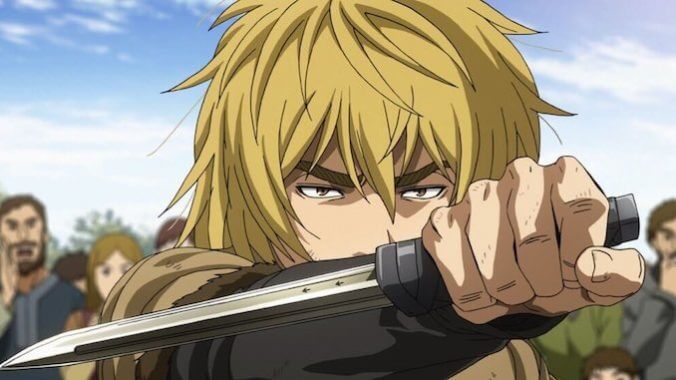Vinland Saga: Why You Need to Start Watching the Best Viking Story on TV
Photo Courtesy of Netflix
“Not a single good thing has happened to me in my entire life” utters Thorfinn, when questioned why he doesn’t fear death. The moment comes in the episode “Snake” from Vinland Saga’s second season (airing now on Netflix and Crunchyroll), and reveals to us just how deep into despair the show’s main character has fallen. He doesn’t fear death because he has been reduced to a state of bare life, Giorgio Agamben’s theory where one can live a life of complete non-existence with no rights and no way to affect their own situation. Stripped of purpose and powerless to fight his current circumstances, Thorfinn shuffles through life as the walking dead. Not quite alive, and easily struck down with little fanfare, he feels worthless. If that sounds dire, that’s because it is. Despite that, and thanks to exceptional writing both from the original manga and its adaptation here in anime form, you continue to hold out hope that Thorfinn will find his way, which is why now is the time to get in on the compelling anime series Vinland Saga if you haven’t already.
Set (mostly) in 11th Century England, and loosely based on the exploits of actual vikings and historical figures of the time, Vinland Saga takes near-mythic tales that have been aggrandized over the ages, and retells them as deeply personal, character-driven stories. The brutality and dehumanization of the Viking Age is on full display, though never glorified, and a complex set of politics and shifting alliances lurk under the surface at all times to provide intrigue. All of this steadily percolates in the background as director Yabuta Shuhei focuses his attention on the characters at the center of the narrative. Scenes are given time to breathe, careful attention to detail adds depth and polish, and this drawn-out approach allows the viewer to bask in the emotional resonance. The series tackles heavier themes than most anime: examining religious beliefs and how we, as humans, see our place in the world; how power structures actively work to keep people down; and how trauma and violence destroys lives.
This season of Vinland Saga is where, in the opinion of many fans of Yukimura Makoto’s source manga, the series really hits its stride. This is quite a statement, considering the entire first season—Prologue—featured incredible characters and established that the world of Vinland Saga is unforgivably ruthless and cold. It was in the first season where Thorfinn’s downward spiral began. As the events of the narrative progress—around Thorfinn, never propelled by him—Thorfinn’s own character growth is stifled at every turn. He seeks revenge, he wants his worth as a fighter to be validated, but time after time he is shot down. It is a very non-traditional approach to character development in anime, which tends to feature characters who may take a beating, but become stronger as a result. In Vinland Saga, Thorfinn only seems to get weaker, more pathetic. It makes for a fascinating watch as characters around him grow, but Thorfinn struggles. It feels relatable.
Through the first five episodes of Season 2, the stage has been set for the “Farmland Saga” arc to dig into its larger thematic elements, with bigger emotional payoffs on the horizon. Following the events of Season 1, Thorfinn, feeling completely defeated, is sold into slavery and ends up working on a farm owned by a man named Ketil. Thorfinn is paired with the newly arrived slave, Einar, to raze a section of forest and grow wheat. Einar works as an excellent foil for the stoic Thorfinn. While Thorfinn has all but given up on life and any semblance of a future, Einar is still an idealist, and laments the cruelty of the world he lives in. Their odd couple pairing not only works as comedy in lighter moments, but Einar’s engaging demeanor is slowly, but surely, pulling the dour Thorfinn out of his personal morass. As the season is picking up steam, characters from the first are starting to make appearances (including a certain Danish prince who has had a real glow-up since his younger days).